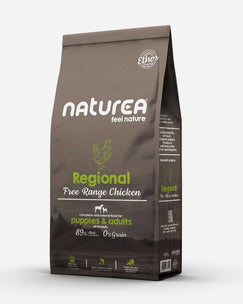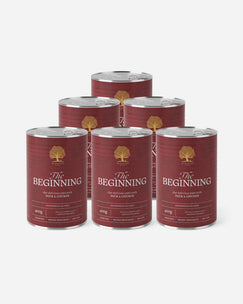Puppy food for small breeds
If you are fortunate to be the owner of a Bichon Frise, Beagle, French Bulldog, or another small puppy breed, you've arrived at the perfect destination. Your small, new puppy deserves the best start for a healthy and thriving life, making the choice of the right puppy food paramount.
During the initial year of life, a puppy's diet plays a pivotal role in their ongoing development, profoundly impacting their growth trajectory.
In the first year, a puppy transitions into adulthood, marked by rapid growth in bones, joints, and cognitive functions. This growth is pivotal for the puppy's overall health and well-being, both in their early stages and as they mature into adult dogs.
Puppy Food for Small Dog Breeds - Nurturing a Healthy Canine Life
Every dog owner aspires for their endearing puppy to experience a life of vitality and well-being. Your puppy should evolve into a cherished family member for years to come. The selection of appropriate dog food contributes significantly to your dog's mental and physical development, ensuring a fulfilling life.
In the inaugural year, your puppy undergoes a transformation from infancy to young adulthood. This rapid evolution is akin to a human progressing from infancy to adolescence within a single year. The swift growth necessitates robust support for the puppy's bones and joints to keep pace. Around the age of three to four months, puppies experience exponential growth, prompting you to cherish these puppy moments before they transition to adulthood.
Making the best choices for your dog instills a sense of satisfaction. The selection of puppy food carries immense significance in this regard.
How to Choose Optimal Puppy Food
The choice of the best dog food for small dog breeds begins by considering your puppy's unique requirements. Small dog breeds necessitate vitamins, proteins, and calcium tailored to their growth phase. The meals introduced during puppyhood exert a considerable influence on energy levels and the development of bones and joints.
Each dog breed follows a distinct growth trajectory. The growth curve for small dog breeds differs from that of larger breeds, emphasizing the importance of selecting puppy food designed for small dog breeds. This ensures the appropriate provision of vital vitamins, minerals, and proteins without excess or deficiency.
Feeding Your Puppy
Should puppy food be moistened? It's a question frequently encountered concerning small dog breeds' feeding. Puppy food for small dog breeds - indeed, all breeds - can be softened using water. This choice hinges on the preferences of both the individual dog and the dog owner.
Soaking food in water facilitates easier digestion for puppies, enhances aroma, and stimulates appetite. Alternatively, serving dry puppy food encourages chewing, contributing to dental strength.
For any uncertainties, feel free to seek counsel from our food advisors. Contact PetLux customer service for inquiries concerning your puppy's specific needs.
Cultivating Positive Mealtime Experiences
Your puppy's mealtimes should be associated with positive experiences. A tranquil, secluded setting devoid of boisterous activity or loud noises fosters an atmosphere of peace during meals.
Promoting a positive mealtime relationship prevents potential adult insecurities, aggression, or stress associated with eating.
Puppy Food - Duration and Transition
Puppy food tailored for small dog breeds is recommended until your dog reaches 9-12 months of age. As a general guideline, your dog can transition away from puppy food when they attain approximately 80% of their adult weight.
At this juncture, you can gradually introduce your dog to adult food. This gradual approach allows your dog to acclimate to the new dietary regimen.
Refer to your small dog breed's growth projection or consult your veterinarian for guidance on transitioning from puppy to adult food.
Considering Grain-Free Puppy Food
Opting for grain-free puppy food is also a viable choice. Grain-free formulations help prevent obesity, mitigate bad breath, and maintain stable blood sugar levels. Common grain sources like corn, wheat, and oats can sometimes pose challenges for digestion. Opting for grain-free puppy food can be a wise decision if your dog faces stomach sensitivities or allergies.
Avoiding Puppy Obesity
Your delightful, food-loving puppy must avoid excess weight gain. Monitoring appropriate food portions, avoiding table scraps, and ensuring adequate exercise are key to preventing obesity.
Excess weight places undue strain on a puppy's bones and joints, potentially compromising their overall health. Vigilance over food portions is essential, and a well-fed puppy should exhibit agility and a proportionate physique.
Seek Professional Advice
For guidance and insights regarding puppy food, consult your veterinarian or the dog's breeder. Should you have queries about products available at PetLux, our team is readily available to assist you. Our priority is assisting you in selecting the optimal puppy food to nurture your beloved puppy's well-being.
























